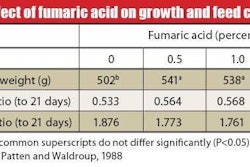The message was clear. When Tyson president and chief executive Dick Bond made the case for most ethanol subsidies to be given the axe, the food versus feed versus fuel debate flamed higher. Bond's statement, reported by CNN's Money.com, came in a statement April 25 and was then reiterated during an earnings call on April 28. In making it, he challenged the U.S. Congress to reduce or drop a federal tax subsidy and end import tariffs on sugar-based ethanol.
While Bond is clear in his belief that America's ethanol boom is the culprit behind the escalating headache of higher feed prices for Tyson's business segments, such views, not surprisingly, continue to be met with skepticism and in some cases, genuine rejection, by those closest to the renewable fuel industry. In fact, one of those on the other side of the fence on the impact of ethanol on animal feeds argument is Archer Daniels Midland Co., one of the largest agricultural processors in the world. ADM processes crops into food ingredients, animal feed ingredients, renewable fuels and naturally derived alternatives to industrial chemicals. It is reportedly the largest U.S. ethanol producer by volume and was itself reporting second-quarter earnings a day after the Tyson call.
Opting out of standard
Bond is quoted by CNN as saying that diverting corn to make ethanol doesn't make sense and he warned that upward pressure on food prices will get much worse with 30 percent of U.S. corn production this year slated for ethanol production. A week earlier, Texas Governor Rick Perry had called for a federally mandated ethanol production target to be slashed in half in that state, a move backed publicly by Bond. Texas is the first state to try to opt-out of the federally mandated standard in the U.S. that encourages use of alternative fuels.
Like Bond, Perry fears that use of ethanol is driving up food prices. In addition to Tyson's backing, the Texas governor garnered the support of poultry giant Pilgrim's Pride Corporation. But meanwhile, the folks at the Renewable Fuels Association (RFA), the U.S. ethanol industry's lobbying voice, describes the allegations as ‘just plain wrong.' In a statement responding to Perry's remarks, RFA President Bob Dineen said not only is ethanol not to blame for contributing significantly to rising food prices, but the industry is actually helping to keep oil prices lower than they might otherwise be.
The Renewable Fuels Standard requires companies that blend ethanol and other additives into gasoline to sell a certain volume of renewables each year until 2022. The U.S. Congress expanded the requirement under the Energy Independence and Security Act of 2007. The revised standard requires the sale of 9 billion gallons per year by the end of this year. The standard ramps up the requirement every year until 2022, when 36 billion barrels of renewable fuels are mandated annually.
The U.S. renewable fuel policy includes a 51-cents-a-gallon subsidy on corn-produced ethanol and a tariff on imports, mainly sugar-based ethanol from Brazil. Bond's preference is for both to be removed, a position staked out ahead of some others in the feed industry who have already asked for a closer look at the repercussions of the mandate, including Cargill Chief Executive Greg Page who has made repeated calls for healthier and more open debate on the food and fuel issue.
Meanwhile, a tax increase on biodiesel in Germany, effective the first of this year, has put the brakes on what was a booming business there. Biodiesel refiners in Germany, making use of rapeseed, are only producing at 10 percent capacity, according to the Reuters story from a European biodiesel conference. That's down from 20 percent the year before. Because of the downturn, some biodiesel manufacturers are said to be taking apart their factories and selling the equipment to manufacturers in the U.S. and Canada.
Like solar energy, production of biofuels is still often dependent upon government support.
Biodiesel can be made out of waste vegetable oil and animal fat, and in fact, Tyson itself has entered a partnership to do just that. But experts say there's not nearly enough available animal oils. to meet demand.
Alterternatives to grain
Others in the agriculture community are also forging forward with alternatives to the diversion of grains for biofuels. Alltech recently announced it has received a grant of up to $30 million from the U.S. Department of Energy (DOE) to be used towards the establishment of its rural community biorefinery. The plant will be one of the first in the U.S. to convet cellulose converted to ethanol and other value-added products.
The facility will also have the capability to produce algae, which can theoretically produce 5,000 gallons of biofuel per acre per year, whereas corn can produce 400 gallons per acre. Additionally, algae can absorb up to 450 tons of carbon dioxide per acre when grown commercially.
The search for renewable fuels is bound to continue and despite promising progress in the use of non-grain sources, its impacts on production agriculture is not going away soon. How long the world can afford to rely heavily on grain to fuel its future is firing up heated debate on all sides.
.jpg?auto=format%2Ccompress&crop=faces&fit=crop&h=48&q=70&w=48)

















